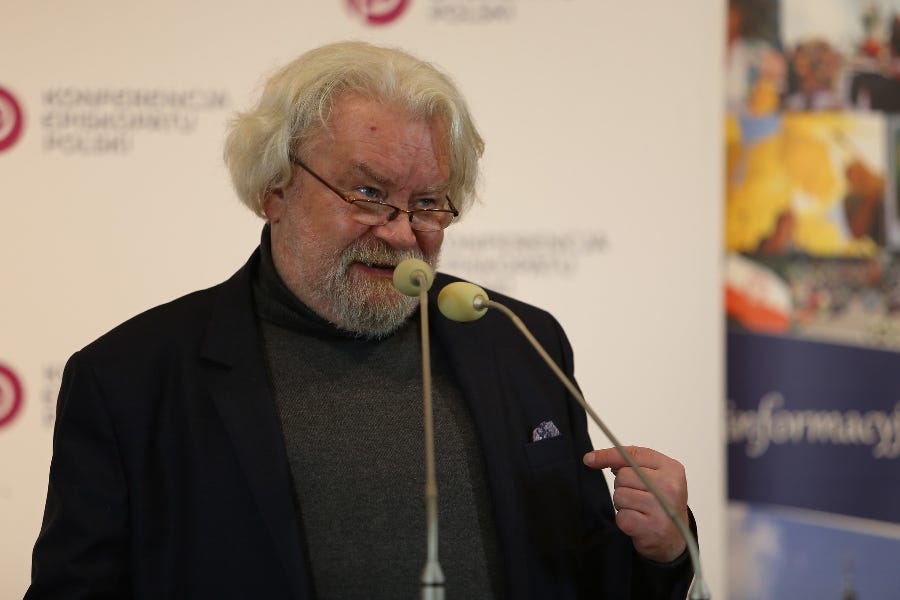Poland’s bishops held a landmark meeting this week with abuse victim advocates.

The two-and-a-half-hour gathering took place behind closed doors in Jasna Góra, where the bishops met for a Nov. 18-19 plenary assembly.
Archbishop Wojciech Polak, the Polish bishops’ delegate for the protection of children and young people, said bishops and victim advocates sat in a circle to enable better conversation.
One abuse victim representative described the Nov. 19 meeting as “extremely open” and “frank.” Another said it was “historic.”
How did the meeting come about? Why is it significant? And what happens next?
The meeting’s genesis
The gathering stems from a letter to Poland’s bishops dated May 13. The letter, signed by 46 abuse victims and addressed to the Polish bishops’ conference’s permanent council, made eight demands.
The first — which got the most media coverage — was for new Polish bishops’ conference president Archbishop Tadeusz Wojda to step aside from his duties amid an investigation into his handling of an abuse case in his Archdiocese of Gdańsk.
The second was for Poland’s bishops to meet with a delegation of abuse survivors during a plenary assembly in 2024.
The letter, which was published May 20, also asked for a date to be announced for the start of an independent inquiry into abuse in the Church in Poland since 1945 and the appointment of a trusted spokesperson for abuse survivors’ rights in the Church.
The Polish bishops acknowledged receipt of the letter on the day it was published. A bishops’ conference spokesman said the permanent council would “take up the issues contained in the letter” at an imminent meeting.
Members of the permanent council replied to the signatories with a June 11 letter, saying they wanted “to listen to you and talk to you frankly.”
The letter, which proposed the Nov. 19 meeting, also responded to the list of demands. Regarding the negligence allegation against Wojda, it noted that the archbishop had asked the Vatican to investigate his actions.
“In this attitude, we see the archbishop’s trust in the Holy Father Francis, the actions of the Holy See, and the established ecclesiastical procedures,” it said.
Concerning the independent inquiry, the letter said that “intensive work” on its establishment began in March 2023 and was nearing completion.

Why is it significant?
While individual Polish bishops have met with abuse victims, there has never been a meeting of the bishops collectively with abuse survivor advocates until now.
Catholic journalist Paulina Guzik noted that such a meeting would have been “unthinkable” five years ago, when the clerical abuse crisis broke out in Poland.
Speaking after the encounter with the bishops, victim representative Robert Fidura said: “We were able to present everything of importance to the bishops, but we also received very personal feedback from them.”
“I am extremely grateful that we have been able to take the bishops a little bit by the hand and we are starting to move in one direction, we are starting to look at certain things very similarly.”
Fidura told the website Stacja7.pl that more than 70 bishops were present, with three absences. One of the absentees had to travel to Rome on urgent business, he said, but “two simply did not come.”
“We don’t know why, they didn’t make excuses,” he said.
Fr. Adam Żak, the Polish bishops’ coordinator for the protection of children and youth, said that while the meeting was certainly “historic” for the participants, it remained to be seen if it would be equally historic for the broader Polish Church.
“I do not want to overestimate the importance of this meeting or to belittle it,” he commented. “I see the hope above all in the fact that, as both the abuse victims and the bishops said at the briefing after the meeting, this was not just an exchange of arguments, but also a real desire to understand each other.”
What’s next?
At their plenary assembly, the bishops heard a report on preparations for the independent inquiry.
